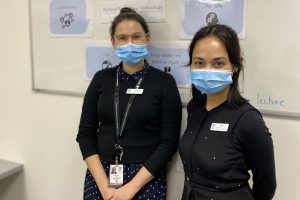
STARS CHAT speech pathologists Emma Greig (L) and Katherine Roxas (R)
Comprehensive High-Dose Aphasia Treatment (CHAT) is a new clinical service and research program delivered at STARS in collaboration with the Queensland Aphasia Research Centre (QARC).
The first treatment of its kind delivered in a health setting in the southern hemisphere, CHAT is a high intensity, evidence based and personalised treatment for people with post-stroke aphasia.
Aphasia is an acquired neurological communication disorder that impacts a person’s ability to understand what they hear, read, say and write. The most common cause of aphasia is stroke.
Research has shown that aphasia has the largest negative impact on health-related quality of life, when compared to 60 other devastating diseases, including cancer, quadriplegia, Alzheimer’s disease and cerebral palsy.
STARS CHAT speech pathologists Emma Greig and Katherine Roxas work with patients to deliver an eight-week treatment program of targeted aphasia therapy.
“CHAT therapy differs from other aphasia treatments in that patients receive a very high dose of personalised aphasia treatment in a short time; over eight weeks participants receive a similar amount of treatment to patients who attend one weekly therapy session over a year,” Emma said.
Patients who participate in CHAT are also involved in clinical research conducted by QARC, whose team includes The QARC team includes Dr Jade Dignam, Professor David Copland, Dr Jessica Campbell, Kate O’Brien and Hannah Wedley.
“Patients have the remarkable opportunity for these leading aphasia researchers to be an integral part of their treatment planning and be involved in improving future aphasia service delivery,” Emma said.
“STARS CHAT patients and their support people can receive peer support, social and emotional connection and practice their communication goals in real-life contexts in our group sessions.”
“We have received overwhelmingly positive feedback from CHAT patients and their support people, with some patients not wanting CHAT to end,” Katherine said.
One patient, a man in his 70s with mild aphasia, said that he avoided all social settings since his stroke due to the stress associated with conversation. In his own words, this man described how he felt in week 4 of his CHAT program:
“Last night in particular we went to the golf club. I spoke fluently and I didn’t have any hiccups. It was just like the old days. See the way I’m talking? It’s so much better. It’s fluent. I’ve got big words that I couldn’t say before… that’s all happened in the last 4 weeks.”
Emma and Katherine lead the delivery of the CHAT program and are supported by the wider STARS speech pathology team, including Director of Speech Pathology and Audiology Kylie Short, advanced speech pathologist Penni Burfein, CHAT-trained speech pathologists Caitlin Fraser and Rachel Levine, and allied health assistants Allison Hearsum and Mitch Weber.